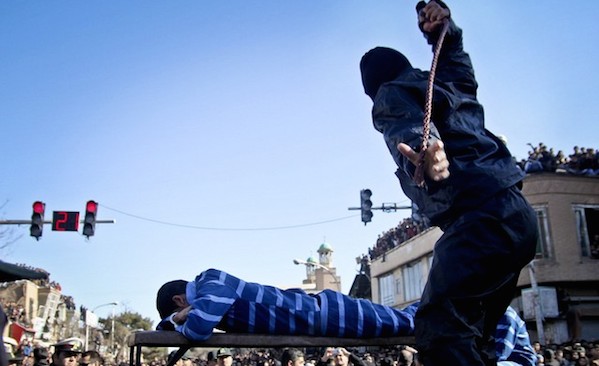Features

In Iran, flogging is a common form of punishment. Iranian courts often sentence journalists, writers, artists and activists to lashes – on exaggerated charges to punish those who are considered too critical of the regime and its leaders.
More than 30 countries in the world use flogging as a legal punishment. In some Islamic countries, both men and women can be punished with lashes, including Iran, Saudi Arabia, Afghanistan, the United Arab Emirates and Qatar, where Islamic lawyers in general acknowledge flogging as a legitimate penalty.
Supporters of flogging as a type of punishment believe it is an effective way to teach the person offending to be a better person – and in any case it works as a deterrent for others. However many psychologists argue the opposite.
It is widely agreed among psychologists that flogging and other types of corporal punishment have damaging effects on victims. Not only does this form of punishment fail as a deterrent, it harms the person psychologically, makes him aggressive and depressed, and only generates more anger and hatred towards the system.
International human rights organizations denounce flogging as torture, regardless of its legal justification, because of the serious psychological and mental harm it causes. Likewise, article 7 of the International Covenant on Civil and Political Rights, of which Iran is a signatory, states that, “No one shall be subjected to torture or to cruel, inhuman or degrading treatment or punishment.”
But the Islamic Republic of Iran ignores both scientific evidence and human rights conventions. Instead, the regime has incorporated flogging in its Islamic Penal Code, thereby legally justifying it. The most common charges with flogging as the punishment include insulting officials, libel and illicit relations, which is often used on the country’s journalists, artists and writers.
Insulting Individuals and Government Officials
Two charges extensively leveled against journalists is insulting individuals or government officials. According to article 608 of the Islamic Penal Code, “Insulting, such as swearing, or using profane language shall be punished by up to 74 lashes.”
In the same category, article 609 states that anyone who insults a government official or civil servant “shall be punished by imprisonment (three to six months), flogging (74 lashes) or a fine.”
Disrupting Public Order
Article 618 of the Penal Code is frequently used against people who participate in demonstrations and protest rallies. “Anyone who disrupts public order,” the article says, “or prevents people from working shall be sentenced to between three months and one year of imprisonment and up to 74 lashes.”
Libel and Spreading False Information
Journalists are especially targeted by article 697 and 698 regarding libel and spreading false information, both of which are punishable by flogging.
The Penal Code’s article 697 states that, “Anyone who through printed press or any other media falsely accuses someone of an offense or crime shall be sentenced to one month to one year of imprisonment and up to 74 lashes.”
And article 697 specifies that, “Anyone who in order to hurt someone else or to disturb public opinion or officials by publishing false information shall be sentenced to two months to two years in prison or up to 74 lashes.” According to the article, the offender shall be punished regardless of whether the published information caused any material or spiritual damages.
Illicit Relations
At first glance, “illicit relations” has no bearing on journalism, but prosecutors often use this charge against journalists, activists and artists to disgrace them. Article 637 of the Penal Code has a very broad and elastic definition of an illicit relation. It states that, “A man and a woman, who are not married to each other, and who commit indecent acts, excluding adultery, such as kissing or sleeping next to each another, shall be sentenced to up to 99 lashes.” Even a public handshake has been used to charge people under this article.
Some of the best-known cases of journalists and artists charged with this offence include cartoonist Atena Farghadani, filmmaker Keywan Karimi, and the poets Mehdi Mousavi and Fatemeh Ekhtesari.
According to Judge Hossein Moradi of Branch 77 of the Criminal Court in Tehran, an illicit relation is one between a man and woman, who have reached puberty, and who is not blessed by the Sharia laws. “This includes meeting in coffee shops, walking in parks and any kind of kissing,” he said in an interview with the newspaper Hemayat. “Of course most young people are ignorant of these rules.”
Arbitrary Interpretation of the Law
Speaking to Journalism Is Not A Crime, Iranian lawyer Moussa Barzin Khalifehloo explains how article 637 does not provide any specific criteria, thus giving judges the power to define an illicit relation as almost anything.
“There have been different interpretations,” he explains. “Some believe that an illicit relation must be physical to satisfy lust, not things like handshakes or kissing each other’s cheeks.”
But some courts and judges have a broader definition, arguing that a relationship falls under this article even when lust is not involved.
“The law specifically cites kissing as an illicit relationship,” says Khalifehloo. “Some courts are strict about this.”
As a result of the law’s lack of specific criteria, judges are free to use it against journalists, writers, artists, poets and political activists. By calling any kind of relationship between a man and woman “illicit,” the judge can easily sentence them to this punishment.
“I had a client who was convicted of an illicit relationship for sending a text message to a classmate,” says Khalifehloo. “As the name implies, the law may be applied to any relationship between a man and a woman outside the framework of Sharia,” adding, “And you know how our Sharia looks at the relations between men and women.”